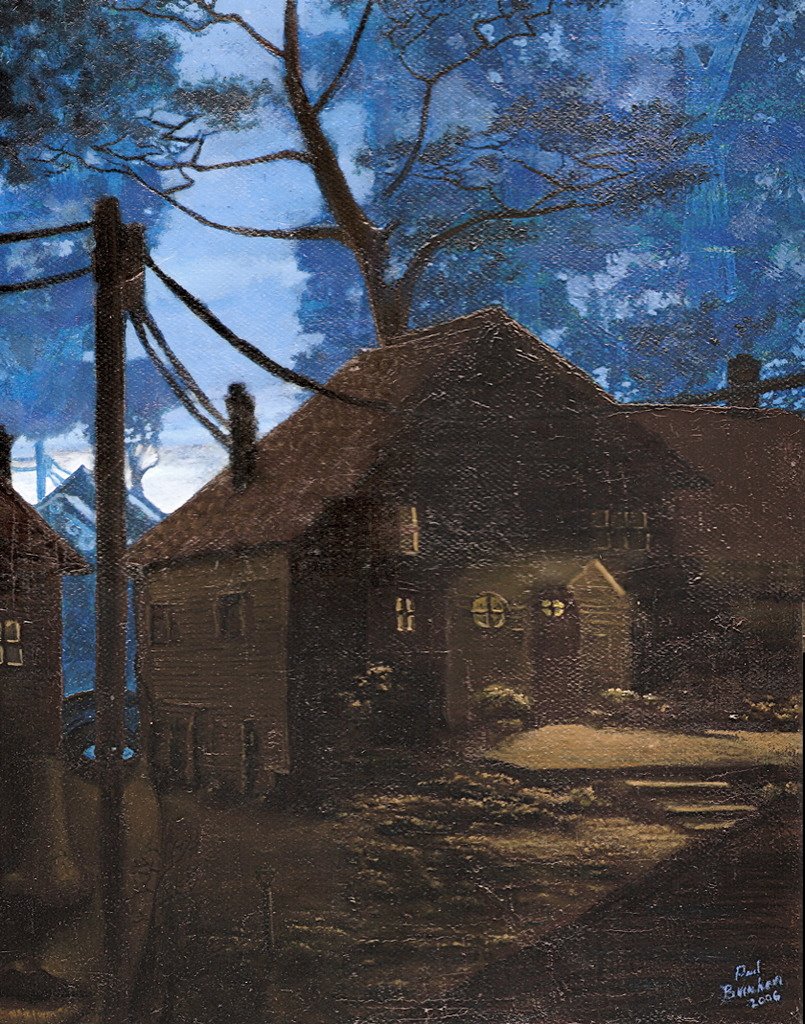They were all quite drunk, but the order was given, and construction of the first fictionarium was started soon afterwards.
Fictionarium- INTRODUCTION

art by @therealpaul 2009
There is a basic formula for ordinary life, and it is a life which most people accept as being the way things have always been- it is the devil that they know.
In a world where a single corporation has taken the place of all governments and religion and has replaced all spiritual truths with material lies, that corporation's main business is to tell the people of the entire world precisely what ordinary life should be like, what is real, and how to purchase it.
It is such a busy world, that business has effectively taken control of the humans by deftly managing their imaginations using calculated sorcerous precision, so that any fun is immediately replaced with the fleeting notions of only a possible future fun, while life itself is perpetually delayed by a crippling work schedule. In such a world, hope has become the consumer's drug of choice, and a future is dangled before the enchanted hordes like lustrous jewels.
Business does well in an imaginary world such as the future, since the customer must pay in advance, and then of course the future, by default, never actually happens. The name of such a business in this world was the Science Board, and the Science Board owned everything. The product that this company sold was 'everything', and the lords of Science simply made sure that everything was inspected, well packaged and marketable, while carefully managing the tedious flow of it's scarcity.
The Fictionarium Experiment
Scientists tend to do experiments, but the social scientists on the Science Board had been elevated to the loftiness of kings, and any experiments were done secretly, usually in dark hidden away places. It was in such a secret lab where these idle hands became restless one foggy night, and a few of the elite members used open glass containers to pour alcohol directly into their own digestive systems, and eventually found themselves standing around a bubbling aquarium in the lounge, tapping on the glass, frightening the fish. It was then that one of these giggling scientists had an even crueler idea.
A little experiment was proposed. At first they were just drinking, having the usual laughs about how easy it really was to harvest an entire human world's energy output, but this new variation was interesting to the bored lords. What if there was a model town that was built- make that two model towns (so that there could be a border between them)- two model towns complete with fire hydrants, City Halls, picket fences and supermarkets. The towns would be constructed completely, down to the last parking meter, and then volunteers could sign up for the experiment to go and live there until the experiment ended.
These volunteer 'citizens' would be given very few instructions, and as subjects of the experiment they would understand that it was a study in science, and that they would relocate to live and work in a remote town with no understanding of what the experiment was about until it was completed.
In their shadowy lab, these high lords of science plotted the outline of their Fictionarium experiment using the prescribed rules of their dark sciences, beginning by washing their hands of any feelings or care in order to avoid accidental contamination of their sterile culture dishes. Their grand test was first to discover how long it would take for the subjects to forget that they were in an experiment, and to then monitor how well these voluntarily captivated subjects would create an ordinary world with which to police themselves.
It was then decided and agreed, among the lofty participants of the diabolical game, that each member would be assigned a Fictionarium duplex to oversee, which would then be stocked with a population of unsuspecting human test subjects. By the light of an aquarium bulb, these Board members laughed at the ingenuity of the new project. They were all quite drunk, but the order was given, and construction of the first Fictionarium was started soon afterwards.
How would a culture evolve if it had no visible masters, and how would it's people conduct themselves without the persistence of the Science Board's artful whip at their backs? Would the Board's familiar sting remain as a subliminal part of the culture, and be seen as a necessary part of civilization, and would the subjects then be compelled to produce whips of their own and start forming their own groups of masters to rule over the rest of the town?
Of course, these kinds of questions had long since been answered by the Board, and they knew very well that the management and control of a civilization's imagination was a daily job, requiring constant attention. Since people are only human, then these human people would return to a natural humane state if they were left alone for a day or two. A well-controlled population needs at least the IDEA of a brutal management, or it will quickly revert back to peaceful cooperation and voluntary co-existence. Indeed, if a civilization was unchecked, it would not take long for it's human components to realize the fact that they were mostly a bunch of nurturing, caring individuals in a large family of beings, and would naturally be unhindered in helping each other, creating a paradise for themselves with instinctive organic vigor.

This was indeed one of Science's most closely guarded corporate secrets, but as far as these Board scientists knew there were no documented, peer-reviewed studies to show how long it would take for this sort of "contamination" to happen in an isolated societal system, or how long the illusion of authority could be sustained in the herd's mind if the whip of constant governance was only subliminally implied.
The Board's members soon realized that their idea for a science experiment would also make a great new sport. A pair of such fabricated towns in the experiment could be called a Fictionarium, and the scientists could become sportsmen, competing for fun and possibly for prizes. A Fictionarium should be built in an area that is rich in natural resources, so that the challenge becomes a matter of keeping the subjects voluntarily living in scarcity in the midst of this great abundance. A Fictionarium would also be profitable and educational, as the scientists would learn how to siphon these resources from the Fictionarium without being noticed, and they would learn the limits of the human subject's reactivity to such experimentation in a controlled environment.
The Conditioners
Each participating Board member would oversee a Fictionarium, and would be allowed to insert operatives into the town's populations in order to try to influence the local structure. These planted operatives would be called Conditioners, and their task would be to maintain the illusion of authority in the minds of the populace for as long as possible without using the traditional means of violence or force. The Conditioner would subtly herd and corral society's mind by using constant fear in the place of barbed wire fences, and being doused with this synthetic fear, the reactive society would then rush to build the barbed fences for themselves.
These Conditioners, also known as 'bishops', would then basically be trained to perpetuate the fearful story of the mighty Science Board and it's watchful presence within the community of subjects, to leave clues and hints, and then to perhaps disappear or die mysteriously because they "knew too much." The sportsmen would recruit their Conditioners from the lower tiers of the Science Board, hone them into champions, and send them valiantly into the midst of these fictional little towns to whisper and suggest the presence of a fearful higher force and it's brutal wrath.
Like sorcerer's apprentices casting their best spells, the Conditioners would tweak the society's mind from behind the scenes competitively. Using these Conditioners, the elite sportsman would attempt to maintain the mirage of an external ruling force by unleashing phantoms, myths, and basic propaganda into the populace.
The Observers
Another level of operatives to be employed within the towns were the agents known as Observers, who watched and listened for any signs of change in the society's mind within a Fictionarium. These were the 'priests', and their job was simply to observe all trends and fashions, and to objectively report this data back to the Board's sportsmen, the elite overseers of the experiment. These undercover Observers were a critical part of the Fictionarium, and were assigned by the learned scientists on the Board to keep an eye on things within the experiment from an objective viewpoint.
Because the town's propagandists Conditioners themselves couldn't logically be expected to assume an objective viewpoint of their own skills, these undercover 'Observer' agents were assigned to monitor their progress. Being such trained liars, deceptionists by preference and profession, Conditioners certainly couldn't be trusted to give accurate reports of their own progress, and the necessity of such a separate level of impartial Observer priests in the experiment was thus obvious to the wise and hardened scientists on the Board.
There were perhaps a dozen of these twin towns built over the years, but after bit of sport for the Board's royal scientists and after a generation of laboratory subjects had animated the program with their lives, interest in the Fictionarium project gradually began to wane. It became too challenging to prevent the subjects from returning to their humane nature without a stern management, and many of the towns were simply reincorporated before they could be contaminated with too much growing awareness- it's subjects hardly noticing that they were once again mindlessly toiling under the flag of the Science Board.
Within the Fictionarium complexes, most of these second generation subjects weren't interested in their town's histories, they were just too busy to be bothered with those old myths and stories. There was always the strong wind of progress blowing them along in their uphill quest for survival, and as long as the Science Board flags snapped loudly atop their poles as a reminder of the old familiar whip, there was no time for stories of Fictionariums. In real life, there were bills to pay.
Of all of the towns that were constructed for this grand experiment, the original Fictionarium town of Hill Valley serves as an fine example of the way the experiment turned out after a whole generation's lives has been spent running it. With a population of around 20,000 subjects, Hill Valley was built right next to an existing science outpost called 77BX, which had been an old abandoned settlement in a very remote area known as The Box. The old outpost became the town of Lakeland, and both Lakeland and Hill Valley were then fabricated to look just like every other small town. These little towns looked and seemed ordinary to the casual eye, and indeed, they were meant to seem ordinary for as long as possible.
In the upcoming chapters here on Steemit, we will be able to take a look inside of what was perhaps the most unique of these fictionarium duplexes; the Hill Valley/Lakeland Fictionarium.
Relax… it's only fiction.
Also, see HERE for a previous Steemit article concerning Fictionarium- it's a fake book report about the fictional book 'Fictionarium', with fake names and dates, in a style influenced by Gorge Luis Borges.
Now, the real book has finally been written by @therealpaul and will be shared here on Steemit in future posts.
Stay tuned by following @therealpaul -- Chapter 1. 'Ordinary World' will be coming soon into your feed. Thanks for reading
FICTIONARIUM
Chapters: (on Steemit soon!)
1. Ordinary World [UPDATE; Ch. 1. now showing HERE on Steemit!]
2. Beulah's DMV Rant
3. The Lights
4. The News Is On The News
5. The Screwtape Emails
6. Lakeland
7. Monday, Day of Rest
(author's artwork 2009) @therealpaul
